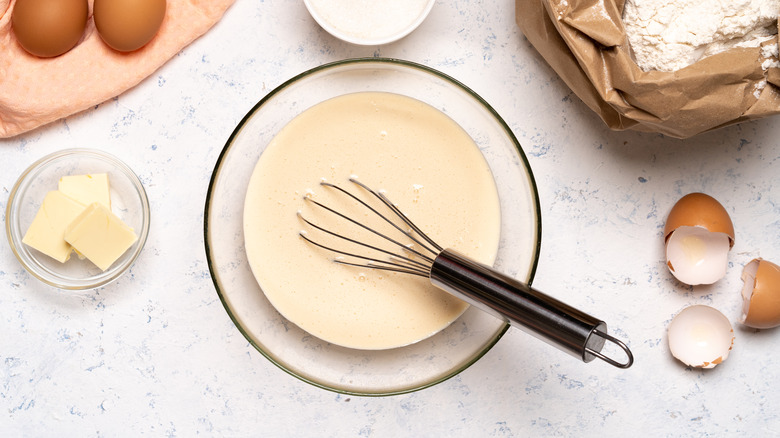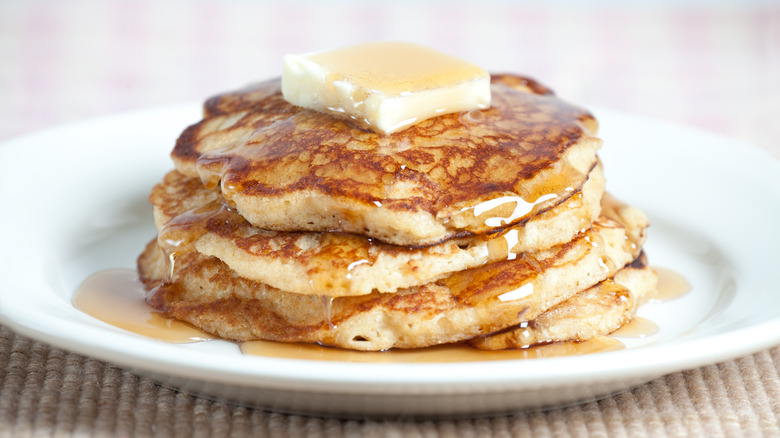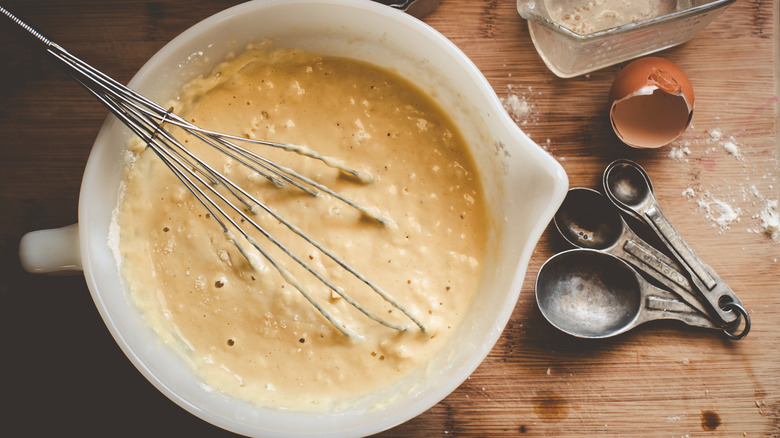Here's What Happens If You Over-Mix Pancake Batter
The next time you make a batch of classic pancakes, it may be tempting to continue mixing the pancake batter until all of the ingredients appear to be smoothly combined. After all, no one wants a stray bite of flour or egg in their pancakes. However, that very smoothness can be detrimental to the outcome of your flapjacks, including causing undesirable issues with texture.
The wet and dry pancake ingredients should first be combined separately, then lightly whisked together once you're ready to cook up the pancakes. A properly mixed batter should still look a little bit lumpy. Although it may seem counterintuitive to leave those lumps in if you want smooth flapjacks, the cooking process will likely take care of those lumps, so no one is at risk of getting a chunk of flour on the end of their fork.
Overmixing pancake batter can cause your flapjacks to deflate, for two main reasons. The stirring or whisking motion may cause the batter's air bubbles to pop, and can also cause too much gluten to develop. Air and small amounts of gluten are both essential in developing the ideal pancake texture. So although the finished pancakes might still taste fine, they may not feel as light and airy as you want them to.
The two main factors for perfectly fluffy pancakes
When your pancake batter is fully and properly combined, there should still be visible air bubbles in the bowl. Most pancake batter recipes call for either baking powder or baking soda because as they react with the batter's liquid ingredients, they rise and create air bubbles. These small pockets of air contribute to the desirably fluffy texture of the flapjacks since they add extra air to the finished cakes. Overmixing the batter can burst these necessary bubbles. For that same bubble-bursting reason, you should never press a spatula down on your pancakes.
Gluten is another contributor to creating the perfect, fluffy pancakes. Although pancakes generally require some gluten to create their structure, too much gluten could become too strong, leaving your pancakes dense and chewy after they're cooked. Too much gluten in pancake batter cuts out space that air bubbles would otherwise occupy. The gluten begins developing as soon as the recipe's flour combines with the wet ingredients, and the processing is accelerated by mixing the batter. Therefore, lighter and slower mixing may prevent excessive gluten development.
Can overmixed pancake batter be rescued?
Fortunately, even if you do accidentally overmix your pancake batter, there may be a way to salvage the mix. You'll want to allow your pancake batter to rest at room temperature for a while before you cook the pancakes. Too much movement from mixing may cause the gluten to work harder, so resting the batter could allow the gluten to relax.
Generally, around 30 minutes will be enough time to remedy the overmixing. However, if the batter is allowed to rest for too long, another issue arises. After about an hour of rest, the air bubbles in the batter will begin to pop on their own. So although the gluten may relax, the resulting pancakes could still turn out flat due to a lack of air.
If you fear your pancake batter may have been mixed beyond repair, an egg could help to salvage the texture. In another bowl, whisk an egg white until stiff peaks form. Then, fold the egg whites into the pancake batter until it's loosely combined, and then cook up the pancakes as usual. The egg whites can help the batter rise a little more as it cooks, creating a fluffier texture.


